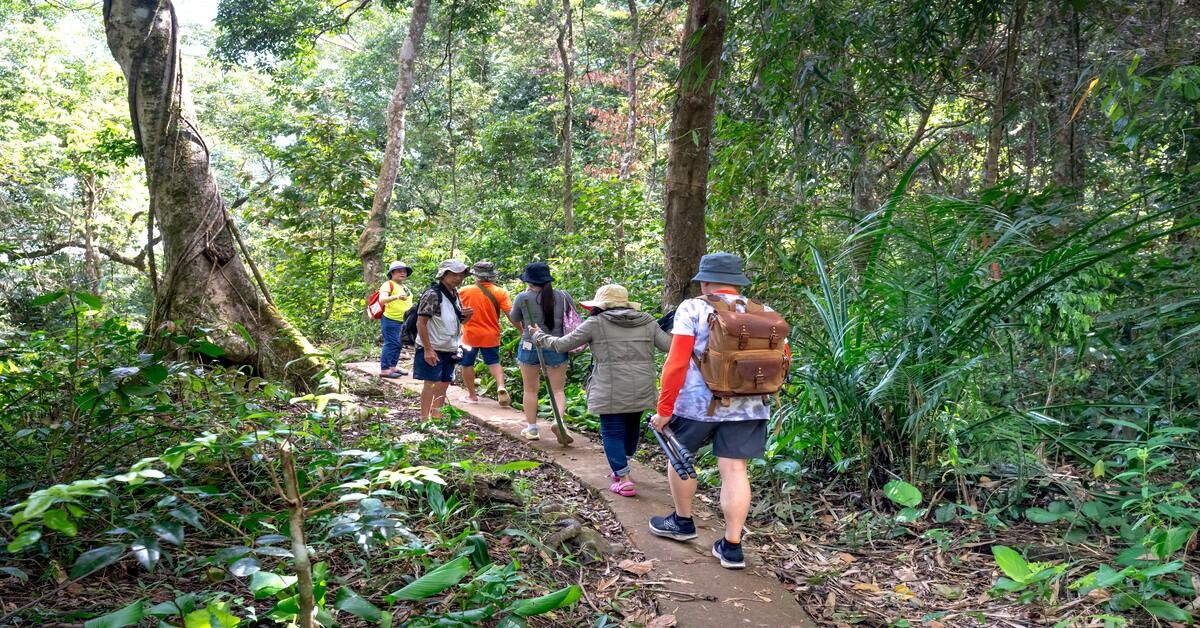Why Is Ecotourism Important
Ecotourism is important for a few reasons: it benefits the environment, local communities, and even the tourists themselves. Here’s a closer look:
-
Environmental Benefits: Ecotourism can be a powerful tool for conservation. The revenue generated from park fees, tours, and accommodation can directly fund projects that protect wildlife and habitats. This helps combat threats like poaching and habitat loss, while also promoting sustainable practices. By showing the economic value of preserving natural areas, ecotourism discourages environmentally destructive activities.
-
Community Benefits: Ecotourism can empower local communities by creating jobs in things like guiding tours, managing lodges, and selling crafts. This provides a source of income that helps fight poverty and encourages residents to become stewards of their environment. Since their livelihood depends on a healthy ecosystem, local communities have a vested interest in protecting it.
-
Educational Benefits: Ecotourism fosters a connection with nature and raises awareness about environmental issues. Tourists learn about local ecosystems, conservation challenges, and different cultures, inspiring them to become more responsible travelers and citizens. This newfound appreciation can translate into positive changes in their everyday lives, like reducing waste or supporting sustainable businesses back home. Don’t Miss to Check Out Our Website: Canada Current
The Core Principles of Ecotourism
Minimizing Environmental Impact
At its heart, ecotourism aims to reduce the adverse effects of travel on natural environments. This involves practices like reducing waste, avoiding overuse of resources, and protecting wildlife habitats.
Building Environmental and Cultural Awareness
Ecotourism emphasizes education for both tourists and residents. It fosters a deeper understanding and appreciation of the natural and cultural environments being visited, encouraging stewardship and sustainable practices.
Providing Positive Experiences for Both Visitors and Hosts
A core tenet of ecotourism is ensuring that the experiences are enriching for travelers and beneficial for the host communities. This dual focus helps in creating meaningful interactions and mutual respect.

Financial Benefits and Empowerment for Local Communities
By directing economic benefits to local communities, ecotourism helps in empowering them. This financial influx can support education, healthcare, and other community projects.
Conservation Efforts and Ecological Sustainability
Ecotourism often involves active conservation efforts, supporting projects that aim to preserve and restore natural environments. It’s about leaving a place better than you found it.
Environmental Benefits of Ecotourism
Preservation of Natural Habitats
One of the significant environmental benefits of ecotourism is the preservation of natural habitats. Protected areas and wildlife reserves gain funding and support through ecotourism initiatives.
Protection of Endangered Species
Ecotourism provides the financial means and public support necessary for the protection of endangered species. This includes anti-poaching efforts and habitat conservation projects.
Promotion of Sustainable Practices
Ecotourism encourages sustainable practices such as the use of renewable energy, waste reduction, and conservation of water resources. These practices help reduce the overall environmental footprint of tourism activities.
Reduction of Carbon Footprint
By promoting local travel and encouraging low-impact activities, ecotourism can help reduce the carbon footprint associated with travel. This includes advocating for the use of public transportation and other eco-friendly modes of travel.
Economic Benefits of Ecotourism
Job Creation
Ecotourism creates jobs in various sectors, from tour guides to conservation experts. These opportunities can significantly improve the livelihoods of local residents.
Boosting Local Economies
The influx of tourists brings in revenue that boosts local economies. This can lead to the development of infrastructure and improved public services.
Diversification of Income Sources
For many communities, ecotourism provides a vital alternative income source, reducing dependence on activities like logging or mining that may be environmentally harmful.
Incentives for Conservation
Economic incentives from ecotourism encourage locals to engage in conservation efforts. When people see the tangible benefits of preserving their natural surroundings, they are more likely to support and participate in these efforts.
Cultural Benefits of Ecotourism
Preservation of Indigenous Cultures
Ecotourism helps in preserving indigenous cultures by showcasing their traditions, crafts, and lifestyles. This not only generates income but also fosters pride and cultural continuity.
Promotion of Cultural Exchange
The interaction between tourists and local communities promotes cultural exchange. This leads to a greater understanding and appreciation of different ways of life, fostering global citizenship.
Enhancement of Community Pride
When local traditions and environments are valued by outsiders, it enhances community pride. This can lead to a reinvigoration of cultural practices and greater community cohesion.
Education and Awareness
Ecotourism serves as a powerful educational tool. It raises awareness about environmental issues and the importance of sustainable living, influencing both tourists and host communities.
Social Benefits of Ecotourism
Community Development
Ecotourism can drive community development by funding schools, health clinics, and other essential services. This can significantly improve the quality of life for residents.
Improved Quality of Life
With better infrastructure and services funded by ecotourism, the overall quality of life in local communities improves. This includes access to clean water, education, and healthcare.
Social Empowerment
Ecotourism empowers local communities by involving them in decision-making processes. This ensures that tourism development is in line with their needs and values.
Networking and Cooperation
Ecotourism fosters networking and cooperation among various stakeholders, including governments, NGOs, and the private sector. This collaborative approach enhances the effectiveness of conservation and development efforts.
Challenges and Criticisms of Ecotourism
Overcrowding and Environmental Degradation
One of the significant criticisms of ecotourism is that it can lead to overcrowding, which may degrade the very environments it aims to protect. Managing visitor numbers and their impacts is crucial.
Cultural Disruption
The influx of tourists can sometimes disrupt local cultures, leading to a loss of traditional practices and values. Balancing tourism with cultural preservation is a delicate task.
Greenwashing and Mismanagement
Not all initiatives labeled as ecotourism truly adhere to its principles. Greenwashing, where businesses falsely promote themselves as environmentally friendly, is a significant issue.
Economic Dependence
Relying too heavily on ecotourism can make communities vulnerable to market fluctuations and changes in tourist preferences. Diversification of income sources is essential to mitigate this risk.
Successful Examples of Ecotourism
Costa Rica
Costa Rica is a pioneer in ecotourism, known for its vast protected areas and biodiversity. Its ecotourism model is often cited as a success story in balancing environmental conservation with economic development.
Kenya
In Kenya, ecotourism plays a vital role in wildlife conservation. Community-based tourism projects help protect endangered species while providing livelihoods for locals.
Bhutan
Bhutan’s approach to tourism focuses on high-value, low-impact travel. This strategy helps preserve its cultural heritage and pristine natural environments.
Norway
Norway’s ecotourism initiatives highlight sustainable practices and conservation. Its emphasis on nature-based activities attracts tourists while promoting environmental stewardship.
Steps to Promote Ecotourism
Government Policies and Regulations
Governments can play a crucial role by implementing policies and regulations that support sustainable tourism practices. This includes protecting natural areas and promoting responsible tourism.
Involvement of Local Communities
Engaging local communities in tourism planning and development ensures that their needs and perspectives are considered. This involvement is key to the success of ecotourism initiatives and fosters a sense of ownership.
Education and Awareness Campaigns
Educating both tourists and locals about the importance of ecotourism and sustainable practices is essential. Awareness campaigns can help change behaviors and promote responsible travel.
Sustainable Tourism Practices
Encouraging tour operators and accommodations to adopt sustainable practices is crucial. This includes energy-efficient measures, waste reduction, and supporting local suppliers.
The Future of Ecotourism
Ecotourism is poised to play an increasingly significant role in the future of travel and conservation efforts.
Technological Innovations
Advancements in technology offer opportunities for more sustainable tourism practices, such as eco-friendly transportation and digital conservation initiatives.
Global Cooperation
International cooperation is vital for tackling global environmental challenges. Collaborative efforts can help protect fragile ecosystems and promote sustainable tourism worldwide.
Evolving Consumer Preferences
As travelers become more conscious of their impact, there’s a growing demand for responsible and authentic travel experiences, driving the growth of ecotourism.
Sustainable Development Goals
Ecotourism aligns with many of the United Nations Sustainable Development Goals, including those related to poverty alleviation, conservation, and sustainable economic growth.
Conclusion
Ecotourism is not just about enjoying nature; it’s about preserving it for future generations while benefiting local communities. By minimizing environmental impact, empowering locals, and promoting cultural exchange, ecotourism represents a sustainable approach to travel that can contribute to both conservation and development goals.
FAQs
What is the main goal of ecotourism?
The main goal of ecotourism is to promote responsible travel that conserves natural environments, supports local communities, and fosters cultural understanding.
How can tourists contribute to ecotourism?
Tourists can contribute to ecotourism by choosing eco-friendly accommodations, respecting local cultures and environments, and supporting responsible tour operators.
What are some popular ecotourism destinations?
Popular ecotourism destinations include Costa Rica, Galapagos Islands, Kenya, Bhutan, and Norway, known for their diverse natural landscapes and sustainable practices.
How does ecotourism differ from traditional tourism?
Ecotourism focuses on sustainable practices, conservation, and community involvement, whereas traditional tourism often prioritizes mass tourism and may have negative environmental and cultural impacts.
Why is local community involvement crucial in ecotourism?
Local community involvement ensures that tourism benefits are distributed equitably, fosters cultural exchange, and encourages stewardship of natural resources.

Jackson dives deep into the heart of Canadian culture, politics, and society to bring you captivating stories that resonate with our diverse audience. With a passion for storytelling and a keen eye for detail, Jackson’s articles offer a fresh take on the issues and events shaping Canada today.
Whether he’s uncovering the latest developments in Canadian politics, spotlighting emerging artists in the Canadian arts scene, or sharing insider tips for exploring Canada’s hidden gems, Jackson’s writing is sure to inform, entertain, and inspire.



